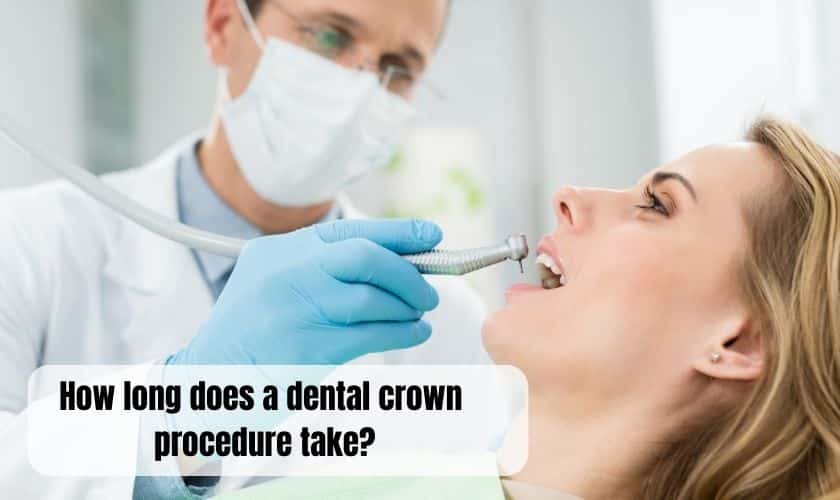
If you have dental implants, you know that they can be an effective way to restore your dental health and improve the appearance of your smile. However, dental implant crowns can sometimes become loose or fall out entirely. If this happens to you, taking action as soon as possible is important to avoid further damage. In this article, we will discuss what to do if your dental implant crown falls out so that you can get the treatment you need and keep your smile healthy and beautiful.
Dental implanting commonly replaces missing teeth due to decay or injury. Implants are typically made from titanium screws inserted into the jawbone, which act as artificial tooth roots for attaching false teeth, known as dental crowns. Although dental implants are a reliable option for restoring dental health, dental implant crowns can sometimes become loose or even fall out completely. If this happens to you, it is important to take action as soon as possible in order to avoid further damage and get the treatment you need.
Symptoms of Loose Dental Crowns
If you have dental implants, several symptoms may indicate that your dental crown is loose. The most common symptom is pain or discomfort when chewing or biting down on food near the dental implant area. Other symptoms include swelling in the gum tissues surrounding the implant, tooth sensitivity to hot and cold temperatures, and visible gaps between the dental crown and the gums.
Contact Your Dentist Immediately
If you experience any of these symptoms or if your dental implant crown falls out, you must contact your dentist immediately for an evaluation and treatment plan. Your dental team will be able to determine the cause of the problem and provide a solution that best fits your dental needs. Depending on the severity of the problem, they may also recommend further treatments, such as dental surgery.
Maintain Oral Hygiene
Maintaining good oral hygiene while waiting for dental treatment is also important. This includes brushing twice daily with fluoride toothpaste, flossing daily, and using an antimicrobial mouthwash. Doing so can help reduce the risk of dental implant failure and the risk of dental infections.
Avoid Hard Foods
Once your dental crown falls out, it is important to avoid hard and sticky foods that could damage the dental implant or cause further discomfort. It is also important to avoid any activities that could put pressure on the dental implant area, such as chewing gum or grinding your teeth. Doing so will help reduce pain and protect the dental implant until it can be treated by a professional.
Types of Dental Implant Treatment
Once your dental team has evaluated your dental issue, they can recommend a treatment plan that best fits your needs. The type of treatment you receive will depend on the severity of the dental issue and the condition of your dental implant crown.
Replacement Crown
Your dentist may recommend a replacement dental crown if the dental implant is in good condition. This involves replacing the existing dental crown with a new one that fits securely onto the dental implant. Your dentist will ensure that the dental crown fits properly by taking measurements and making any necessary adjustments for a comfortable fit.
Dental Surgery
In some cases, dental surgery may be necessary if there is damage to the dental implant or surrounding tissues. During this procedure, your dental team will clean any debris from the affected area, repair damaged tissues, and secure a new dental crown. After dental surgery, you may need to rest for a few days and follow a special dental care plan.
Bone Grafting
If the dental implant has become loose due to bone loss, your dental team may recommend a bone grafting procedure. The dental team will place additional bone material into the affected area during this procedure to strengthen the jawbone and support the dental implant. This procedure can take several months to complete and requires multiple visits to your dental office for further treatments.
Dental Implant Care After Treatment
Once your dental treatment is complete, it is important to care for your dental implants to ensure long-term success properly. This includes practicing good oral hygiene, avoiding hard and sticky foods, refraining from chewing gum and grinding your teeth, and visiting your dental team for regular dental exams and cleanings. Following these steps can help increase the lifespan of your dental implants and reduce the risk of dental implant failure.
Dental implants are a great way to replace missing teeth. However, it is important to contact your dental team immediately if you experience any dental issues or if your dental implant crown falls out. Additionally, it is important to practice good oral hygiene and avoid hard and sticky foods until the dental issue has been resolved. Following these steps can help ensure long-term success with your dental implants.
FAQs
If your dental implant crown falls out, you will typically experience pain and discomfort in the affected area. Additionally, you may notice that the dental crown is no longer attached to the dental implant.
The healing process usually takes several weeks to months to complete. During this time, following your dentist’s instructions and practicing good oral hygiene are important.
If your dental implant fails, it may need to be removed or replaced with a new one. Additionally, dental surgery may be necessary to repair any damage and secure a new dental crown.





